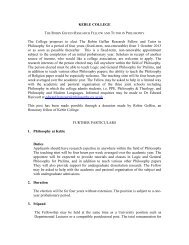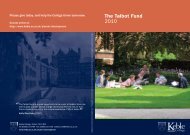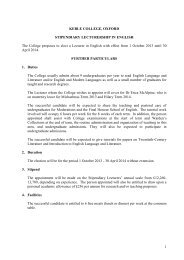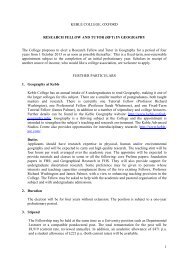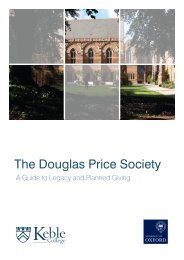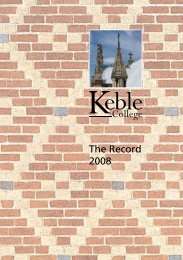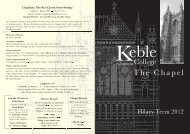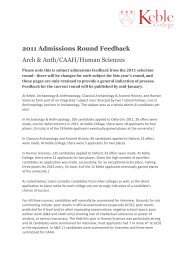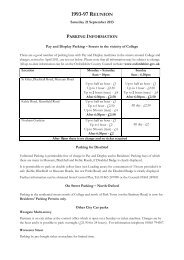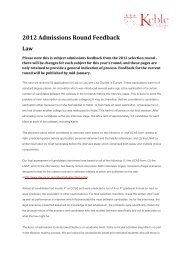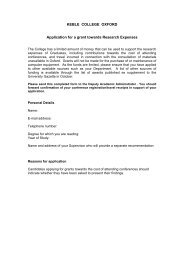The Record 2009 - Keble College - University of Oxford
The Record 2009 - Keble College - University of Oxford
The Record 2009 - Keble College - University of Oxford
Create successful ePaper yourself
Turn your PDF publications into a flip-book with our unique Google optimized e-Paper software.
<strong>The</strong> <strong>College</strong> at Large<br />
Harper and Row, 1973), p. 64.]. My parents with their truncated<br />
elementary education shared Weil’s perception that such a<br />
‘transcendent kingdom’ exists.<br />
We are currently (late <strong>2009</strong>) misgoverned by an elected body<br />
which may be the worst since Chamberlain’s appeasement<br />
cabinet <strong>of</strong> 1938. Even so, I would acknowledge that anyone<br />
attempting to govern, whether it is done well or ill, is facing<br />
a perennial, ineluctable, and probably insoluble problem.<br />
Put in the form <strong>of</strong> a question it reads: ‘how do you translate<br />
intractable values into tractable instruments and effects?’ This<br />
question applies as much to the arts and to education as to<br />
forms <strong>of</strong> polity. In education and the arts (particularly poetry<br />
as it so happens) it is concentrated in the struggle to sustain<br />
unpredictable yet unassailable intensity — let’s call it ‘intrinsic<br />
value’ — with some form <strong>of</strong> communication with others, a<br />
form <strong>of</strong> communication to which such terms as ‘relevance’<br />
and ‘accessibility’ relate only as terms <strong>of</strong> helpless and hapless<br />
travesty.<br />
<strong>The</strong> question <strong>of</strong> insolubility need not be crippling; it may<br />
indeed be salutary, if it is kept in mind as, so to speak, a tensile<br />
thread in the mind between what is pre-eminent but probably<br />
unsustainable and what is predictable, or expedient, but underachieving.<br />
Know thyself.<br />
Education in particular is currently in thrall to a species <strong>of</strong><br />
technocratic ‘angelism’ as one <strong>of</strong> my early poetic masters<br />
Allen Tate (1899–1979) could well have said. Such angelism<br />
latterly in vogue as ‘social engineering’ cares no more for the<br />
heritage <strong>of</strong> my parents (for all its impertinent chatter about<br />
the ‘under-privileged’) than it cares for the intellectual and<br />
sensuous terrain <strong>of</strong> a notoriously ‘rebarbative’ poet approaching<br />
extinction. I have only very recently encountered Frank<br />
Musgrove’s: ‘<strong>The</strong> English working class has been betrayed twice<br />
in my lifetime: first in the General Strike <strong>of</strong> 1926 and then forty<br />
years later when the grammar schools “went comprehensive”’.<br />
[Cited in Chris Woodhead, A Desolation <strong>of</strong> Learning: Is This the<br />
Education our Children Deserve? (s.l.: Pencil Sharp Publishing,<br />
<strong>2009</strong>), p. 135.] This now seems to me as indisputable as William<br />
Morris’s denunciation (in 1883, at <strong>Oxford</strong>) <strong>of</strong> the workings <strong>of</strong><br />
‘anarchical Plutocracy’. [William Morris, Collected Works, 24 vols<br />
(London: Longmans, Green and Company, 1910–15), vol. 23, p.<br />
191 (‘Art under Plutocracy’). ] But <strong>of</strong> course it will be disputed,<br />
perhaps by readers <strong>of</strong> <strong>The</strong> <strong>Record</strong>, especially by those who have<br />
come triumphantly through a ‘comprehensive’ education. All<br />
credit to past and present working class members <strong>of</strong> <strong>Keble</strong><br />
51



